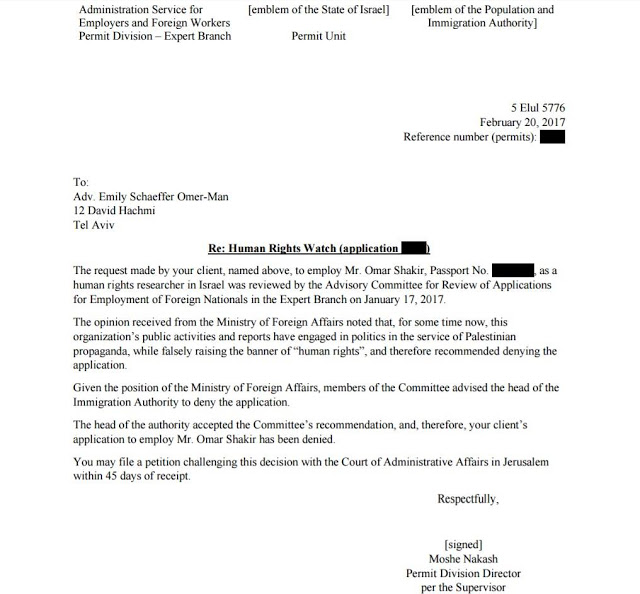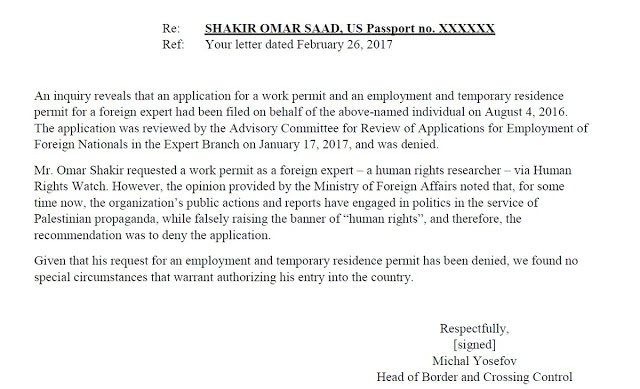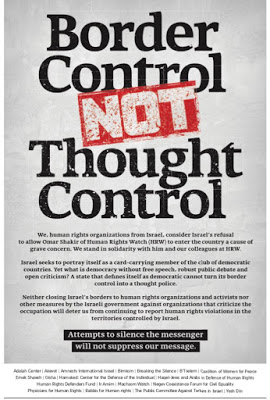What has Israel got to hide (apart from torture, internment, extra-judicial
executions & state-sponsored child abuse)?
 |
| It’s strange to think but some people still classify Israel as a democracy |
The effective functioning of civil liberties and human rights
groups, free from state interference in their activities, is the hallmark of a
democracy. In Israel civil liberties
groups, which are respected in most West European countries, are seen somewhat
differently. They are the enemy, traitors,
the enemy within, agents of terrorism etc.
They are the fifth column doing the work of the Arabs.
which are looked on with favour by the government. However Israel has now gone a step further
and refused to issue work permits to many of those working in the human rights
field thus intending to cripple them.
 |
||
| Illustrative: A screenshot from an Im Tirzu video, ‘outing’ four leftists as defending terrorists. Caption reads: ‘When we fight terrorism, they fight us.’ YouTube |
malpractice. Even the worst government would
not openly dare to attack former soldiers who wish to expose the crimes of
their own army Not so in Israel. Anyone criticising the armed forces must be an
agent of terrorism. Below are two
articles on the current situation. A typical article is Breaking the
Silence: Sabotaging Israel from within by the settler
news agency Arutz Sheva.
 |
An Israel flag flies near a Jewish settlement in Hebron West Bank Palestinian Territories. Israel is refusing to issue visas to Human Rights watch, accusing the NGO of having a ‘hostile’ agenda in its reporting of human rights violations. Photograph: David Levene for the Guardian
Israel
|
Israel has refused to grant a work permit to a staff member
of Human
Rights Watch.
In a letter,
Israel’s interior ministry alleged that Human Rights Watch works in the
“service of Palestinian propaganda, while falsely raising the banner of ‘human
rights.’”
The allegation, the letter added, had been made by Israel’s
foreign ministry, which had recommended denying an application for a work
permit made on behalf of Omar Shakir. He had
been appointed the Human Rights Watch director for Palestine.
The letter, sent earlier this week, does not go into any
further details.
Human Rights Watch has described
the decision as “an ominous turn.”
“It is disappointing that the Israeli government seems
unable or unwilling to distinguish between justified criticisms of its actions
and hostile political propaganda,” Iain Levine, a Human Rights Watch
representative, said.
The group stated that it had “regular access without
impediments” to the occupied West Bank and present-day Israel for almost three
decades. However, it noted that Israel has been blocking it from entering Gaza
since 2010 – except for one visit last year.
Human Rights Watch says its team has worked with many arms
of the Israeli state, including the police and military, and had even been
called upon by the foreign ministry to intervene in a case where Israelis were
victims of human rights abuses.
Limbo
Human Rights Watch asked the Israeli authorities that Omar Shakir, a US
citizen, be granted a work permit in July last year.
Israel’s interior ministry regulations state that a
decision on work permit applications should take up to 60 days. In Shakir’s
case, it took seven months.
Shakir told The Electronic Intifada that he has been
waiting in limbo in New York until he was given a guarantee of entry by Israel.
“It has certainly impeded our work,” Shakir told The
Electronic Intifada, explaining that he was scheduled to meet with Israeli
officials last December regarding human rights abuses of Israeli citizens. He
was unable to attend that meeting because of the delay in processing his
application.
Human Rights Watch has retained local counsel and will
challenge the decision.
“In the meantime,” Shakir said, “we will continue to do our
research and documentation.”
“With this decision, Israel puts itself in the same group
as Sudan, Uzbekistan, North Korea and Egypt, all of which have barred Human
Rights Watch from entering,” he added. “But we still monitor those countries,
and we will continue to monitor abuses in Israel and Palestine.”
Ban on BDS activists?
Shakir said the last time the group needed to apply for an
Israeli work permit was in 2011. On that occasion, it was granted a permit,
without encountering any difficulties.
Shakir has previously worked for Human Rights
Watch in Egypt and as an attorney at the Center
for Constitutional Rights, a New York-based organization.
But Shakir explained that the denial was not about him.
Foreign organizations in Israel must go through a two-step process to hire
foreign nationals.
The interior ministry assesses the organization first and
then investigates the individual who is seeking a permit.
Human Rights Watch did not get past the first step, Shakir
said.
Human Rights Watch has noted that the rejection of its
application came amid “increasing pressure” against those who monitor Israel’s
activities.
Last year, Israel’s parliament, the Knesset, passed
a law that required Israeli human rights groups to report
foreign funding.
The Knesset is poised to pass a law in
the near future that would deny entry to foreign nationals who support the
Palestinian call for boycott,
divestment and sanctions (BDS) against Israel.
In December, Israel detained,
interrogated and deported Isabel Apawo Phiri, associate director of the
World Council of Churches, claiming that she was affiliated with the BDS
movement.
Refusing the visa for a Human Rights Watch worker will
further mar Israel’s already tarnished reputation over its human rights record.
Israel is reportedly
re-examining the decision on orders from Prime Minister Benjamin Netanyahu,
after the US administration “voiced discontent,” the Tel Aviv newspaper Haaretz
reported on Friday.
Human Rights Watch does not take a position on BDS but it
did publish a report in January 2016 that called
on businesses to halt their work in the settlements that
Israel has built in the occupied West Bank.
 |
| Letter from Israeli government to Human Rights Watch explaining their decision to prohibit Shakir from entering and working in Israel. (Photo: Human Rights Watch) |
authorities denied Human Rights Watch’s (HRW) Israel and Palestine director a
work visa, the group announced in a statement on Friday. The group said
Israel’s Interior Ministry accused HRW of “Palestinian propaganda” and
not being a “real human rights group.”
Shakir was informed that he would be unable to obtain his visa, on Feb. 20,
though the information was not public until Friday.
Interior Ministry reportedly cited an opinion received from Israel’s Foreign
Ministry, which stated that HRW’s “public activities and reports have engaged
in politics in the service of Palestinian propaganda, while falsely raising the
banner of ‘human rights.”
well-known nonprofit, nongovernmental human rights organization made up of
roughly 400 staff members around the globe, has a history of being critical of
Israel’s many human rights violations, labeled so according to international
law and conventions.
responded to the denial on social media, slamming the Interior Ministry’s
decision.
Israeli government is hardly the only one among the 90+ countries we cover to
disagree with our findings, but branding us propagandists and fake human rights
advocates puts Israel in the company of states like Egypt, North Korea and
Sudan who have blocked access for our staff members,” Shakir said. “Israel
claims to be only democracy in the Middle East, but is barring us at a time
when our staff is based in and freely operates in several other countries in
the region.”
the denial comes as a surprise (we have had regular access to Israel/West Bank,
though not Gaza for three decades), it comes amid increasing pressure on
Israeli and Palestinian rights groups and a wide-ranging assault on basic
democratic values. Blocking our access will not silence us,” he added, “We will
continue to scrupulously investigate abuses, expose the facts and struggle
every day to defend the inherent human dignity of all.”
Levine, deputy executive director of programs at Human Rights Watch said the
decision and the “spurious rationale” behind it “should worry anyone concerned
about Israel’s commitment to basic democratic values.”
disappointing that the Israeli government seems unable or unwilling to
distinguish between justified criticisms of its actions and hostile political
propaganda,” Levine said.
afternoon, Emanuel Nahshon, a spokesperson for Israel’s Interior Ministry told Mondoweiss
that Shakir “may enter Israel with a tourist visa” adding that “with regard to
the work visa, this may be reconsidered if the organization appeals the
Ministry of Interior decision.”
of 17 Israeli human rights organization condemned the Interior Ministry’s
actions, calling the visa denial a “cause of grave concern.”
seeks to portray itself as a card-carrying member of the club of democratic
countries,” the joint statement said, “Yet what is democracy without free
speech, robust public debate and open criticism? A state that defines itself as
democratic cannot turn its border control into a thought police.”
organizations that signed the document were listed as: Adalah Center, Akevot,
Amnesty, International Israel, Bimkom, Breaking the Silence. B’Tselem.
Coalition of Women for Peace, Emek Shaveh, Gisha, Hamoked: Center for the
Defense of the Individual, Haqel-Jews and Arabs in Defense of Human Rights,
Human Rights Defenders Fund, Machsom Watch, Negev Coexistence Forum for Civil
Equality, Physicians for Human Rights Israel, The Public Committee Against Torture
in Israel and Yesh Din.
closing Israel’s borders to human rights organizations and activists nor other
measures by the Israeli government against organizations that criticize the
occupation will deter us from continuing to report human rights violations in
the territories controlled by Israel,” the groups added. “Attempts to silence
the messenger will not suppress our message.”
signed by Israeli NGOs protesting the government’s decision to prohibit Human
Rights Watch’s country director from working in Israel. (Photo: Facebook
About Sheren Khalel
Sheren Khalel is a freelance multimedia journalist who
works out of Israel, Palestine and Jordan. She focuses on human rights, women’s
issues and the Palestine/Israel conflict. Khalel formerly worked for Ma’an News
Agency in Bethlehem, and is currently based in Ramallah and Jerusalem. You can
follow her on Twitter at @Sherenk.
